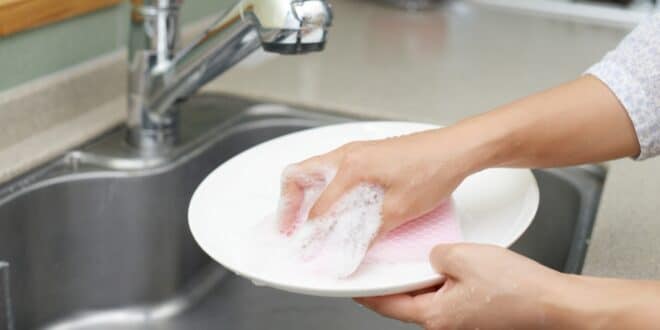The home in which I grew up never had a dishwasher other than my mother and myself. No one in our immediate family owned a dishwasher, and I did not until I was in my mid-30s. I didn’t hate washing dishes, but I did prefer doing other tasks or my own ways to spend time.
During my teen years, Mother and I were supposed to trade off washing and drying supper dishes, but that often turned into a disagreement about whose turn. So I frequently resigned myself to wash since I could do that faster and then go about my homework, etc. (I’m sure my mother had long fulfilled her lifetime quota of dishes since she cooked, canned, and froze produce also.) My own children got turns at washing and drying dishes during a rental year when we did not have a dishwasher. I hope that helped them appreciate the work of making meals and having their own dishwashers later.
Childhood Memories
Washing dishes several times each day has brought back childhood memories of family holidays and celebrations at my aunts’ homes with the women of the family. We were an old-fashioned group where the women cooked and cleaned while the men discussed, watched sports, or digested after big family meals. Sometimes my father escaped doing outside chores if the holiday was held at our house.
Decisions had to be made about which girl cousins would wash or dry while grandmothers examined silverware, cleaned off the turkey bones, and the mothers dealt with leftovers or messes. During those times, the women bonded by sharing gossip, encouragement, recipes, family stories, or disagreements between mothers and daughters. Sometimes we younger girls might learn about a long-dead ancestor or the history around a dish or platter that was being dried.
Modern conveniences have certainly freed up our time to pursue other choices rather than kitchen duties. They can also lead to more times of labor isolation. Some other observations while being the main dishwasher: I don’t tend to pile up dirty dishes in the side sink since it soon becomes evident that pots and pans will overflow or we will run out of silverware. There is no place to hide accumulating dishes until there is a full load. And it looks nasty. I also tend to wipe out or clean the sinks more often. I spend more time in the kitchen and more time contemplating while washing and drying. A simple satisfaction arises when I walk away from a job completed until the next meal, much like the therapy of washing a car.
Freeing Up the Mind
Manual labors can free up the mind to engage in thinking, planning, creating, and even praying or talking to God. Like finding the little chips or nicks in glasses or dishes, I can become more aware of what in my life needs attention while my hands are in warm, soapy water. I understand that the ancient Celtic Christians believed that their everyday duties were the very act of living out prayer. This may indeed be the way that we can “pray continually,” as instructed in 1 Thessalonians 5:17. Caring for my home is not wasted time but another way to express gratitude and stewardship for possessions, love for my family, and preparing a place for whoever is welcomed to our door.
I will still be happy to get my current dishwasher fixed and have more evening time to relax. However, I miss those gatherings of women in the kitchen. The grandmas and most of the mothers are gone now. I remember them if I happen to wash one of the antique dishes.
Questions for personal journaling or group discussion:
- What kind of labor division did you have in your childhood home, and how do you, or would do it now?
- What modern convenience is most important in your life?
Karen Spruill writes from Florida.
If you enjoyed this, you may also enjoy People in the Attic
© 2002 - 2025, AnswersForMe.org. All rights reserved. Click here for content usage information. Answers for Me Support & encouragement for every-day life
Answers for Me Support & encouragement for every-day life



